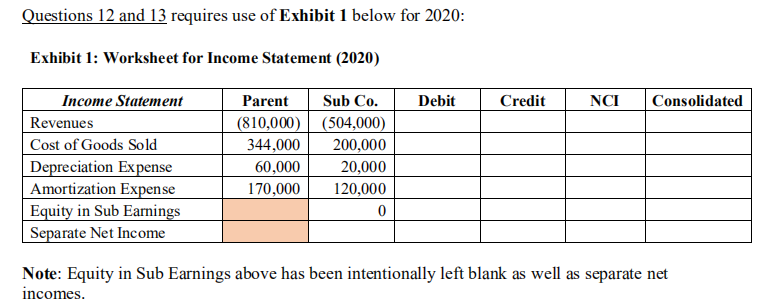Question
Part A. Use the following fact pattern to answer multiple choice questions 1 through 15, with sub-instructions for particular questions : On January 1, 2018,

Part A. Use the following fact pattern to answer multiple choice questions 1 through 15,
with sub-instructions for particular questions:
On January 1, 2018, Parent Co. acquired 80% of Sub Inc. by paying $800,000. Non-controlling
interest was valued at $200,000. Sub reported common stock on that date of $520,000 with
retained earnings of $352,000. A building was undervalued in the company's financial records by
$18,000. This building had a ten-year remaining life. Copyrights of $80,000 were not recognized
and should be amortized over 20 years. Sub earned income and paid cash dividends as follows:
Net Income
Dividends Paid
2018
$115,000 $64,600
2019
$144,400 $71,600
2020
$164,000 $94,000
On December 31, 2020, the Parent owed $20,800 to Sub Inc. There have been no changes in
Sub's common stock account since the acquisition.
To answer questions 1 through 3, prepare the allocation of the acquisition on January 1, 2018.
In your presentation, but sure to show the excess fair value over cost allocated to the identifiable
assets, and any resulting goodwill. In addition, for the identifiable assets, be sure to calculate the
annual amortization of excess fair value over book value.
1. What is the fair value of Sub Co. at the acquisition date (1/1/18)?
A. $825,000.
B. $1,000,000.
C. $800,000.
D. $200,000.2. How much is the allocation of the excess fair value allocated to copyright?
A. $64,000.
B. $8,000.
C. $72,000.
D. $80,000.
3. The goodwill resulting from this 80% acquisition is?
A. $30,000.
B. $24,000.
C. $48,000.
D. $0.
To answer questions 4 through 7, prepare journal entries that Parent is required to record
associated with the investment under the Equity Method in 2020 before consolidation.
4. The journal entry to record Sub Co.'s income for 2020 would require a:
A. Debit to Equity in Sub Earnings, $131,200.
B. Credit to Equity in Sub Earnings, $164,000.
C. Credit to Equity in Sub Earnings, $131,200.
D. Debit to Investment in Sub Co., $164,000.
5. The journal entry to record the parent's receipt of the Sub Co. dividend for 2020 would require
a:
A. Debit to Equity in Sub Earnings, $75,200.
B. Credit to Equity in Sub Earnings, $75,200.
C. Debit to Investment in Sub. Co., $75,200.
D. Credit to Investment in Sub. Co., $75,200.
6. The journal entry to record the excess amortization for 2020 would require a:
A. Debit to Equity in Sub Earnings, $4,640.
B. Credit to Investment in Sub Co., $5,800.
C. Debit to Equity in Sub Earnings, $5,800.
D. Debit to Amortization Expense, $4,640.
7. At the end of 2020, after recording all the necessary journal entries, what is the balance in the
Investment in Sub Co. account?
A. $835,680.
B. $940,640.
C. $1,140,640.
D. $937,160.
2Questions 8 through 11 involve Worksheet Entries for 2020:
8. Consolidation Worksheet Entry S would require a debit to Retained Earnings-S for:
A. $475,200.
B. $506,560.
C. $492,640.
D. Unable to determine.
9. Consolidation Worksheet Entry S would require a credit to Non-controlling Interest for:
A. $203,540.
B. $198,310.
C. $199,040.
D. $201,775.
10. Consolidation Worksheet Entry A would require a credit to Non-controlling Interest for:
A. $24,340.
B. $25,600.
C. $22,120.
D. $23,280.
11. Consolidation Worksheet Entry A would require a debit to Building for:
A. $12,600.
B. $14,400.
C. $11,520.
D. $10,080.
34
Questions 12 and 13 requires use of Exhibit 1 below for 2020:
Exhibit 1: Worksheet for Income Statement (2020)
Income Statement
Parent
Sub Co.
Debit
Credit
NCI
Consolidated
Revenues
(810,000)
(504,000)
Cost of Goods Sold
344,000
200,000
Depreciation Expense
60,000
20,000
Amortization Expense
170,000
120,000
Equity in Sub Earnings
0
Separate Net Income
Note: Equity in Sub Earnings above has been intentionally left blank as well as separate net
incomes.
12. Calculate the Non-controlling interest income for 2020 using Exhibit 1 above. How much is
the NCI income for 2020?
A. $32,800.
B. $32,480.
C. $31,640.
D. $32,000.
13. Calculate the controlling interest income for 2020 using Exhibit 1 above. How much is the
controlling interest income for 2020?
A. $362,560.
B. $394,200.
C. $236,000.
D. $354,800.5
Questions 14 and 15 requires use of Exhibit 2 below for 2020:
Exhibit 2: Worksheet for Balance Sheet (partial) (2020)
Balance Sheet (selected)
Parent
Sub Co. Debit
Credit
NCI
Consolidated
Buildings (net)
304,000
470,200
Copyrights (net)
880,000
540,000
Non-controlling Interest
Hint: When calculating NCI, do not forget dividends from Retained Earnings Statement.
14. Using data in Exhibit 2 above, what would be the consolidated balances for Buildings and
Copyrights, respectively at the balance sheet date?
A. $772,400; $1,416,000.
B. $772,400; $1,496,000.
C. $786,800; $1,488,000.
D. $786,800; $1,416,000.
15. Using data in Exhibit 2 above, what would be the Non-controlling interest in the subsidiary
at the balance sheet date?
A. $253,960.
B. $222,320.
C. $216,440.
D. $235,160.


Step by Step Solution
There are 3 Steps involved in it
Step: 1

Get Instant Access to Expert-Tailored Solutions
See step-by-step solutions with expert insights and AI powered tools for academic success
Step: 2

Step: 3

Ace Your Homework with AI
Get the answers you need in no time with our AI-driven, step-by-step assistance
Get Started


